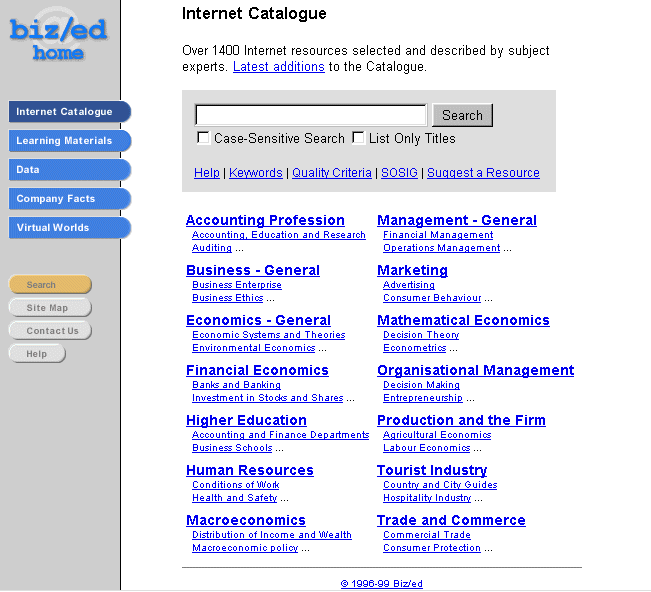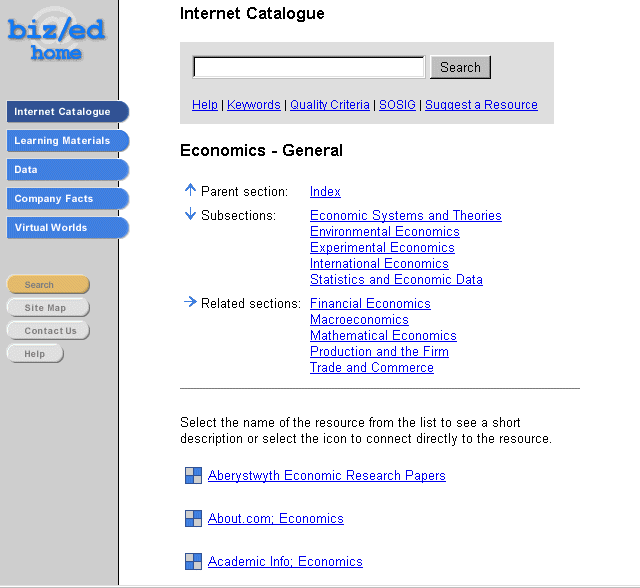Biz/ed Bulletin on Business and Economics
The Hub
From 1 August Biz/ed is continuing resource discovery for the subject areas business, economics and management under the auspices of the Social Science, Business and Law Hub funded by JISC through the Resource Discovery Network Centre [1].
SOSIG [2] will act as an umbrella to a number of catalogues including Biz/ed’s. Biz/ed will continue to have its own interface and look and feel, and Biz/ed’s records will continue to form the economics and business sections of the SOSIG hub. However with the model of devolving resource discovery extended to other subjects that are covered by the hub, we have found it useful to make some technical, display-related, and categorisation changes to Biz/ed.
There are two main aspects to these changes: the change from ROADS v1 to ROADS v2, and the extension of categories to improve access to the catalogue for academic economists.
ROADS v2 [3]
The software underlying the Internet Catalogue has recently been upgraded from ROADS v1 to ROADS v2. This version offers a number of advantages over the previous version, including greater stability, better support for cross-searching and the ability to create a more sophisticated search interface.
At the same time, resources describing departments and business schools have been split off into a separate departmental database. This has been particularly important for Biz/ed’s inclusion in the SOSIG hub, since SOSIG records are divided into two databases, departmental records and the main catalogue. The previous cross-searching of the entire Biz/ed database with the general SOSIG database meant that Biz/ed departmental records appeared in general SOSIG searches of the main database. Now they appear in the correct database, and we have seamless cross-searching and cross-browsing of Biz/ed from SOSIG.
A major change to the Internet Catalogue is the switch from flat browsing of resources to hierarchical browsing. Biz/ed’s classification scheme has been altered so that each browsable section has a parent section and also related sections, so as to establish links between separate branches of the hierarchical tree. Instead of users being faced by 54 categories when they choose to browse the Catalogue, they are now shown 14 main categories and can then drill down to find the category they desire.
Considerable thought went into deciding which categories should appear at the root of the tree. The aim was to make drilling down into the tree as intuitive as possible. This means that the hierarchy does not always follow that of the Dewey classification system Biz/ed uses, and some of the top level categories (for example Mathematical economics) do not correspond to any Dewey category. Instead they are dummy categories designed to group sub-categories intuitively. Dummy categories do not have any resources in their top level. The root of the hierarchical tree, based on these categories, is shown in Figure 1 and a subsection is shown in Figure 2.
Fig 1: Biz/ed browse tree: subsection [4].
Fig 2: Biz/ed browse tree: subsection [5]
Classifications for academic economists
The switch to hierarchical browsing has made us think carefully about the display of the categories, but also the overall shape of the catalogue. Biz/ed has a strong schools user community because of its non-catalogue resources, especially the teaching materials, which are aimed largely at GCSE/A-level. Because the resource Discovery Network is primarily aimed at higher education and research, it is important that Biz/ed has sufficient coverage of economics, business and management at this level.
In the past no resource has been excluded because its content was felt to contain material of a higher level than that required by schools, and descriptions are generally appropriate to both levels. However when I joined Biz/ed in January 1999, coming from an academic economics background, it was clear after that there were gaps in the catalogue with respect to the current state of higher education and research in economics. This is partly because the split between school level economics and higher level is acute in the subject itself. In particular mathematical economics does not appear a great deal in A-level syllabi, but is increasingly important in academia. Therefore to increase the attractiveness of the catalogue to academic researchers and lecturers and tutors we have taken the opportunity of moving from ROADS v2 to ROADS v2 to add the following economic categories to the Biz/ed classification system. (see also the Biz/ed Bulletin in Ariadne Issue 19 [6] for the business categories added)
| New Dewey Decimal Number | Subject Coverage |
| 330.015195 | Econometrics |
| 330.015196 | Game Theory |
| 330.015197 | Decision Theory |
| 330.015198 | Experimental Economics |
Perhaps the most important of these new subjects is econometrics. This is a large and growing sector of economics, concerning the theory and practice of testing economic models using statistical data. Game concerns the analysis of strategy, and uses statistical theory to model types of uncertainty. Decision theory uses mathematics and logic to analyse decision-making. Finally Experimental economics, although not a large section of the academic discipline, is an interesting and growing part, and has a substantial presence on the web.
After discussion with university libraries and the subject community, and the other classification indexes, we decided to place econometrics, decision theory and game theory under the general heading of ‘mathematical economics’, while experimental economics was placed into the catch all general economics category (together with economic data, Environmental economics, economic systems and theories, and economic history and geography).
To illustrate the kinds of resources we are collecting under these subjects are some descriptions of recent resources added to the catalogue. For game theory, a useful resource for undergraduate level is Advanced Decision Theory - Game Theory Lecture Notes [7]. This is an example of a resource which may be extremely useful to students and lecturers, but which might not be catalogued, because it is the web version of undergraduate computer science lecture notes. However the content is just the same as would be for an undergraduate introductory game theory course - a detailed technical introduction to game theory.
Another interesting teaching resource for game theory is ComLabGames [8]. This is a freely downloadable piece of software that can be used for interactively demonstrating games such as the prisoner’s dilemma. It can be played by many players over a network, and can be configured by the tutor. At the end of the game it displays payoffs and results of play. It could be very useful for demonstrating the principles and format of game theory to undergraduates, and as a practical demonstration of strategy.
For Decision Theory I have chosen a site that would primarily be useful for researchers. The Decision Analysis Society website [9] is a part of INFORMS (Institute for Operations Research and the Management Sciences), an organization of operations researchers and management scientists. The site includes a huge alphabetical listing of papers and books on decision theory compiled by a researcher. The listings are primarily for his own personal use, but this place is a very useful place to find references on this topic - for example at the start of a literature review. The site also includes a lexicon of decision making, and listings for journals, software, employment opportunities, and research opportunities. This site also demonstrates the close relationship between operations research and economic decision theory: this is an management site, but the bibliographic list is also appropriate for economic decision theory.
For Econometrics we have a ‘web book’ by Christopher Ferrall, an Associate Professor at the Economics Department of Queen’s University, Kingston, Ontario, Canada: HyperMetrics: Lecture Notes in Econometrics [10]. The book contains sections on regression, multiple regression, and the logit and probit models. A similar web book for introductory game theory is Game Theory: An Introductory Sketch [11]. Both would be suitable for use as introductory undergraduate textbooks or references.
Finally we have the Iowa Electronic Markets [12] as an example from the experimental economics category The Iowa Electronic Markets are real-money futures markets in which payoffs depend on economic and political events such as elections. There is currently a political market running for the 2000 congressional elections, and non-political markets in computer share prices and the Microsoft price level. An example: before the 1996 presidential elections you could buy what were effectively shares in the presidential nominees; since Clinton won, shares in Clinton were paid at $1 per share when the result of the election was known. In the meantime the price of the shares in the nominees could be studied as reactions to political events. This data is still downloadable. Although this site is run by the University of Iowa College of Business, this is equally an example of the sorts of experiments that could be performed in the name of experimental economics.
A related site is the Election Calculator [13], a site that uses econometric analysis of GDP and other economic indicators to predict who ‘should’ have won (according to their equations) in past US elections.
References
- [1] Resource Discovery Network
(Site not yet publicly available) - [2] SOSIG
http://www.sosig.ac.uk - [3] ROADS
http://www.ilrt.bris.ac.uk/roads/ - [4] Biz/ed Browse page: root
http://www.bized.ac.uk/listserv/listhome.htm - [5] Biz/ed Browse page: subsection
http://www.bized.ac.uk/roads/htdocs/subject-listing/econgen.html - [6] Ariadne Issue 19
http://www.ariadne.ac.uk/issue19/bized/ - [7] Advanced Decision Theory - Game Theory Lecture Notes
http://www.cse.unsw.edu.au/~morri/comp9514/ - [8] ComLabGames
http://www.cmu.edu/comlabgames/ - [9] Decision Analysis Society website
http://www2.fuqua.duke.edu/admin/site/extorg/daweb/ - [10] HyperMetrics: Lecture Notes in Econometrics
http://qed.econ.queensu.ca/walras/custom/300/351B/notes/index.htm - [11] Game Theory: An Introductory Sketch
http://www.coba.drexel.edu/economics/mccain/game/game.html - [12] Iowa Electronic Markets http://www.biz.uiowa.edu/iem/
- [13] Election Calculator
http://www.mit.edu/people/irons/myjava/ecalc.html
Author Details
Libby Miller
Biz/ed Economics Section Editor
ILRT
University of Bristol
8-10 Berkeley Square
Bristol
BS8 1HH
Email: libby.miller@bris.ac.uk
Web site: http://www.bized.ac.uk/
